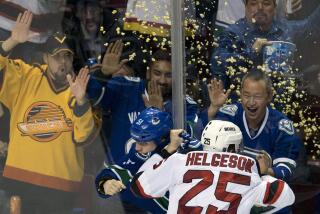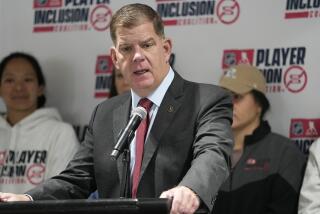Front-Office Enforcer : Former NHL Brawler McPhee Canucks’ Second in Command
- Share via
The last time George McPhee had seen Murray Craven, Craven’s fists were flailing at McPhee’s head amid a bench-clearing brawl between the New York Rangers and Philadelphia Flyers.
When they met again last March, McPhee couldn’t resist getting in one last jab.
“I said, ‘I kicked your butt in the fight, now I get to kick your butt in contract negotiations,’ ” McPhee said, laughing.
These days, McPhee wears tailored suits instead of bloody uniforms, and records his triumphs at the bargaining table as the Vancouver Canucks’ director of hockey operations.
A prolific scorer at Bowling Green University and winner of the 1982 Hobey Baker award as the nation’s top college player, McPhee became an enforcer when injuries stalled his development in the NHL. His playing career was distinguished only by his 257 penalty minutes 115 games over seven seasons, and his fearlessness in facing foes who towered over him.
“Pound for pound, he was one of the toughest players in the game in his time,” said New York Islander General Manager Don Maloney, McPhee’s Ranger teammate and close friend. “He’s 5-9 and was maybe 180 pounds soaking wet, and there he was, taking on Dave Brown, who was 6-5, 230. He wasn’t afraid of anybody.”
Maybe not, but he was never totally comfortable as a muscleman, either. And no longer obligated to play a role he never wanted, McPhee is using his brain, instead of his brawn, to carve out an impressive second career as the Canucks’ second in command.
“Any individual who played in this league would love to be involved with a team,” said McPhee, who negotiates all the Canucks’ contracts, oversees the minor league system and helps evaluate talent. “It’s competitive, and it’s a lot of work and pressure, but there’s also some instant gratification.”
His current project is reorganizing the Canucks’ farm club in Hamilton, Canada, in the wake of the local owners’ financial failure.
“I don’t think anything will come close to being a player in the NHL,” he said. “The next closest thing is coaching or management.”
Said Maloney, “He might not have had all the talent in the world on the ice, but nobody every doubted his intelligence. Of all the up-and-coming younger people in off-ice positions in this league, he’s one of the most intelligent.”
Smart enough to have earned a law degree from Rutgers University in New Jersey after he retired as a player in 1989, McPhee turned a summer internship with the Canucks into a full-time job when he graduated. He was there only a year and had barely turned 35 when NHL Commissioner Gary Bettman, intrigued by McPhee’s background and education, recruited him to be the league’s senior vice president and director of hockey operations.
“George is bright and he’s got a great future in the game,” Bettman said. “He’s motivated, a self-starter, as shown by his going back to law school.”
Bettman approached McPhee after having been turned down by Hartford General Manager Brian Burke, who was McPhee’s predecessor in Vancouver. When McPhee decided to stay in Vancouver and continue his education under his boss and mentor, Pat Quinn, Bettman went back to Burke and didn’t take no for an answer.
As Bettman sees it, the NHL and the Canucks both came out winners.
“George has a lot of Brian’s character,” Bettman said. “He played the game, he’s got a law degree and he’s gotten terrific experience in a good organization. He’s smart, he gets along with people. I think he’s going, at some point, to be running a club.”
Although he loved playing in New York, where he was a fan favorite and part-owner of several popular restaurants, McPhee doesn’t regret passing up the league job.
“It was crystal clear I made the right decision when I went to training camp and got involved in things my second time around,” he said. “My first year, it took awhile to assimilate everything. I had a couple of salary arbitrations and I didn’t know the personnel. But now, it feels right.”
He finds it a better fit than his old role of agitator and protector. He fought because it helped the team, but he hated that he might be stereotyped as a mindless goon.
“I know the perception was out there,” he said. “I also knew that’s what it took for me to play in this league, and that I was doing what was best for the New York Rangers, and maybe not what was best for my career.
“I always felt I could play, not at the level maybe of Rick Tocchet (a rugged winger and three-time 40-goal scorer), but come in and play physical and score. That I could play without having to resort to being a tough guy. But I never seemed to be able to stay healthy long enough.”
He’s an eloquent defender of fighting in hockey, convinced it’s a release of tension and a natural part of the game, if not always desirable.
“I’m not an advocate of fighting, I’m just against its abolition,” he said. “There’s all kinds of arguments you can present, but you have to remember, the tool of our craft is a hockey stick. It’s a fast, physical game where you’re battling for territory and you might have the tendency to turn and use your stick. You take the tool of your trade and turn it into a weapon. I’d prefer to see players drop their sticks and have a fistfight instead of using their sticks.
“I did some research and over the past 12 years, the Vancouver Canucks had only two players injured fighting. But injuries from stickwork, particularly the last three, four years, have gone up.
“And that’s from a player-safety perspective. From an entertainment perspective, I’ve watched games in Europe, in Finland, Czechoslovakia (where fighting is banned), where there’s very little physical contact and there’s no anticipation of something happening. It’s too predictable. It’s boring. I can’t watch it.”
After a franchise-best 7-1 start, the Canucks have settled into second place in the Pacific Division. Their offense has slumped since last season because of Pavel Bure’s leg injuries and the loss of center Petr Nedved, who is holding out after scoring 38 goals and 71 points last season.
Trying to sign Nedved occupied most of McPhee’s time this summer and during training camp. He tried to sway public opinion in the Canucks’ favor by publicizing that the club’s offer of $650,000 plus $220,000 in bonuses would have tripled Nedved’s old salary, but that didn’t affect Nedved’s resolve. Reluctantly, McPhee decided to go on without the center, although recent trade talks make him optimistic that the Canucks might yet get something for Nedved. “It hurts the club, but if they’re going to put a gun to our head, they’d better be prepared to pull the trigger,” McPhee said.
Hard-line bargaining is one of his less enjoyable tasks, but it’s an essential skill for a general manager. He still wants to run a club someday, but is in no rush to leave a city as beautiful as Vancouver or an organization as solid as the Canucks.
“I happen to love what I’m doing,” McPhee said. “Pat Quinn is one of the finest and most decent men I’ve ever met. In addition to that, he’s brilliant and a great hockey man to learn from. He wears three hats, so I get to do things people in my position on other clubs don’t get to do.”
Said Quinn: “Certainly he’s GM material. He’s got to flesh out some areas in the future, but no doubt that this fellow is someone to watch.”
More to Read
Go beyond the scoreboard
Get the latest on L.A.'s teams in the daily Sports Report newsletter.
You may occasionally receive promotional content from the Los Angeles Times.







